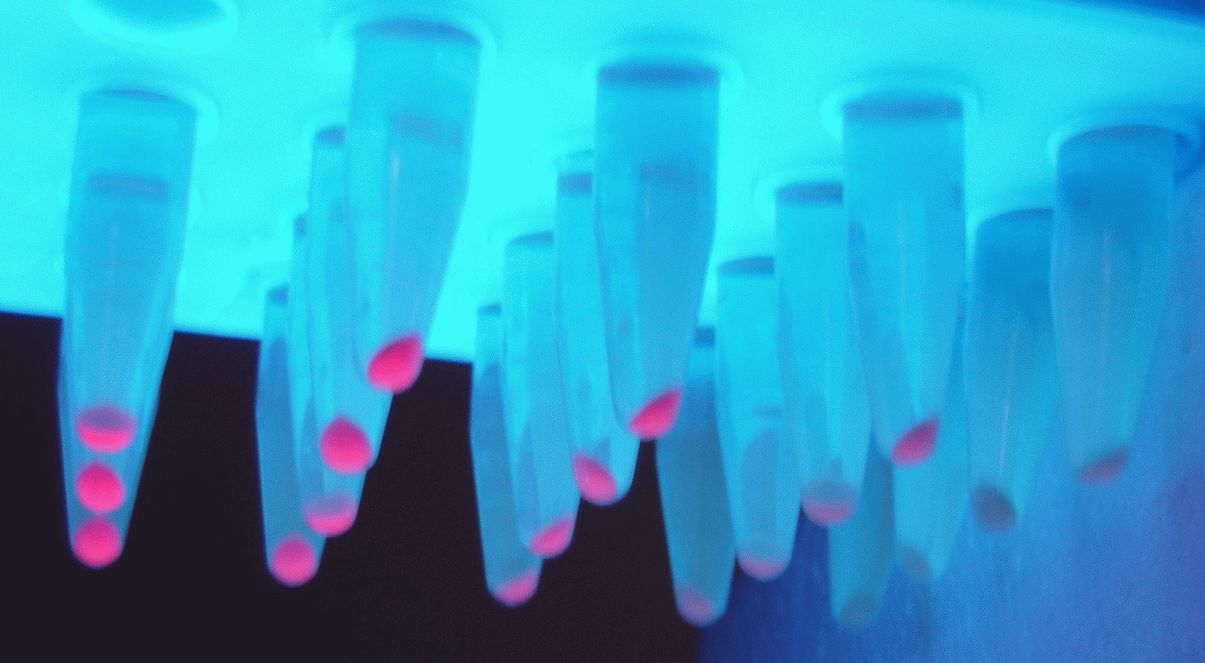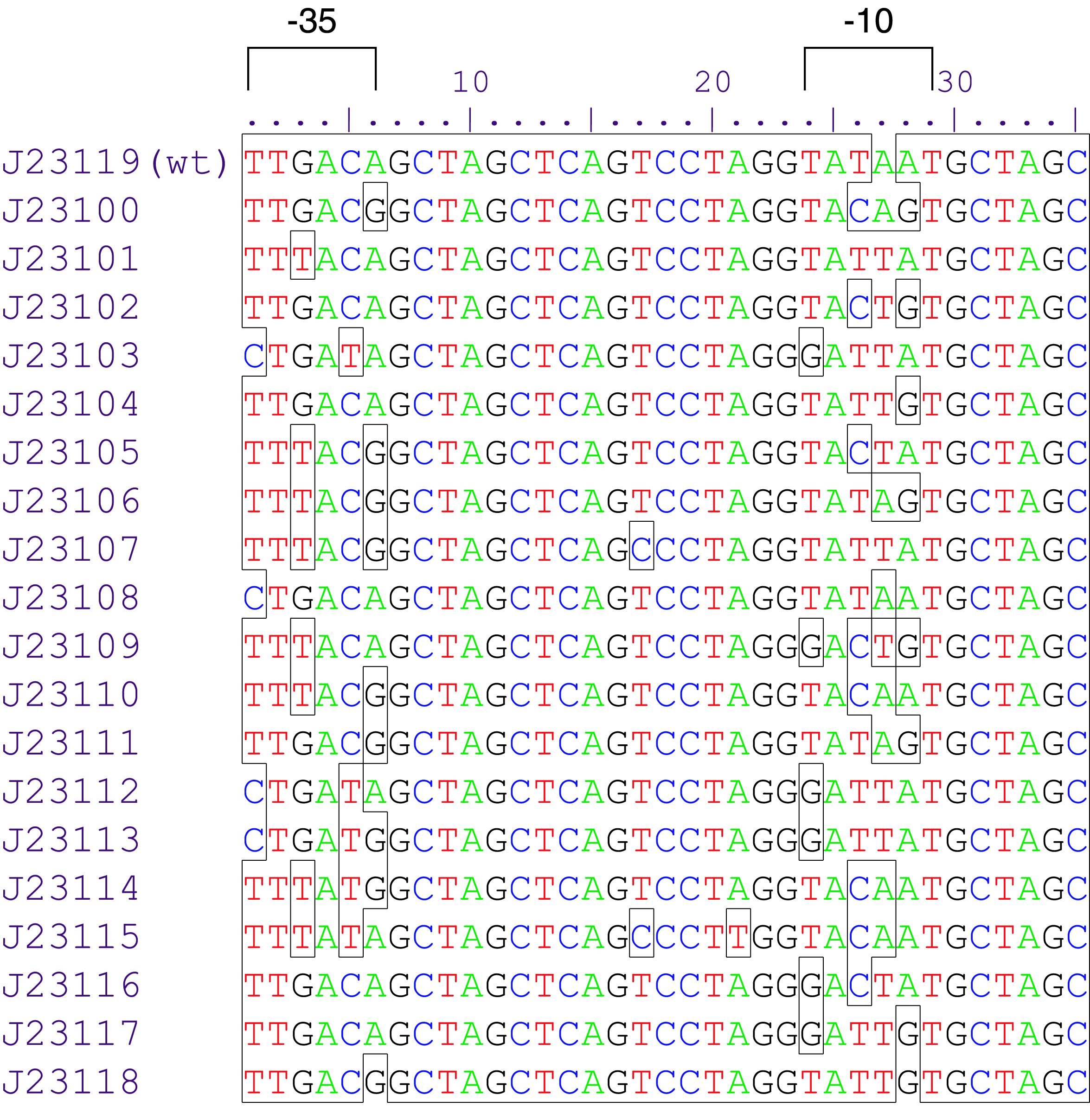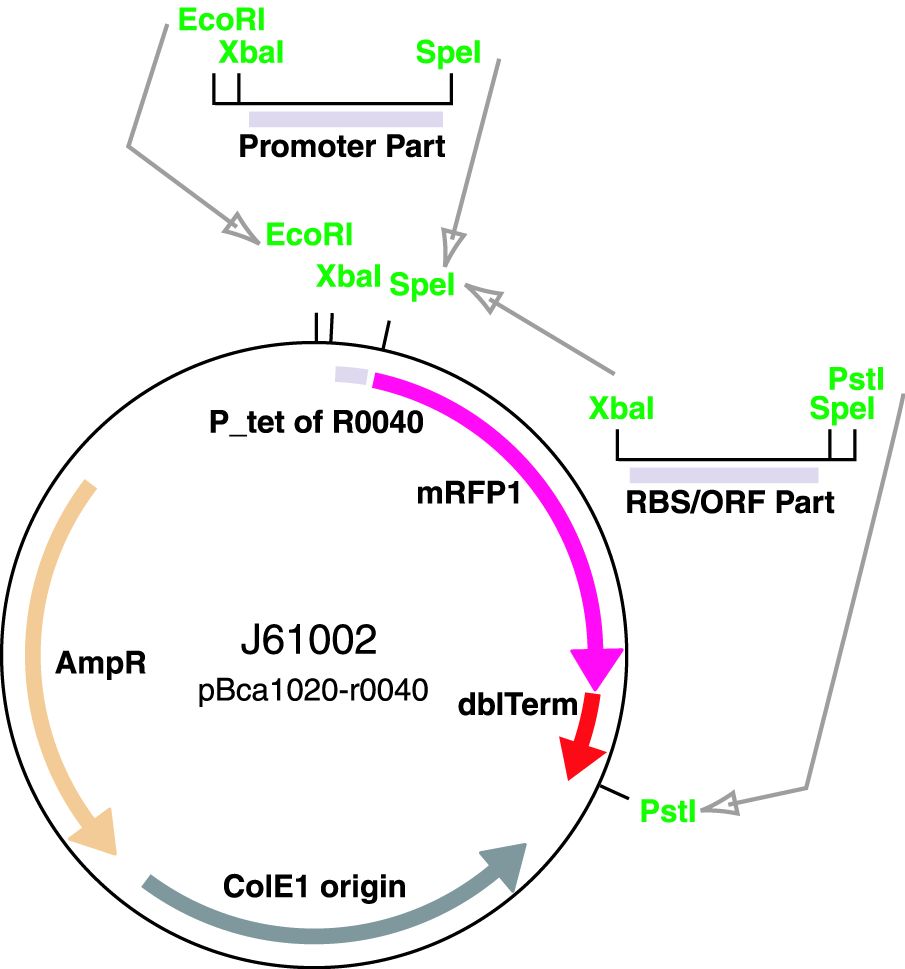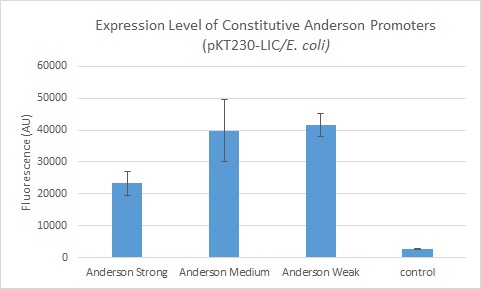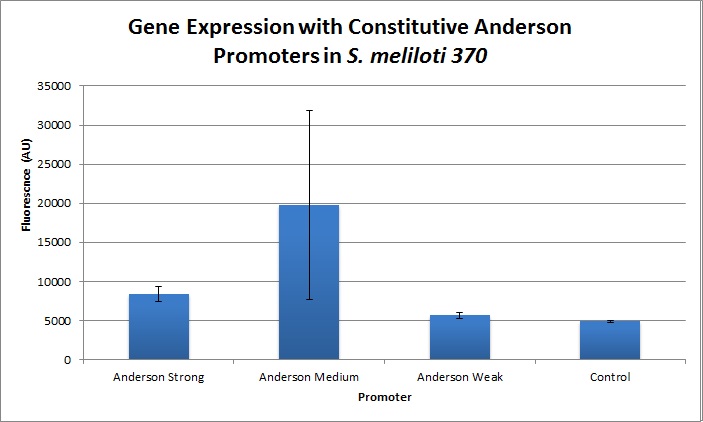Difference between revisions of "Part:BBa J23114"
JCAnderson (Talk | contribs) |
Jinchentian (Talk | contribs) |
||
| Line 4: | Line 4: | ||
{{Berk2006iGEM_JCA_TCPromoters}} | {{Berk2006iGEM_JCA_TCPromoters}} | ||
| − | + | ||
===Usage and Biology=== | ===Usage and Biology=== | ||
| + | The Yale iGEM team has assembled this promoter to citrine (an improved version of YFP, with excitation peak at 514nm and emission peak at 527nm) and a T7-terminator to quantify the level of expression in E. coli and in non-model organism hosts. This construct is available as the biobrick [https://parts.igem.org/Part:BBa_K1856002 K1856002]. | ||
| + | |||
| + | This construct has been successfully cloned into E. coli using the broad-host range vector pKT230, a RSF1010 derived plasmid, as well as using the pPZP200 plasmid which can be transformed into agrobacterium and rhizobium. Leaky expression of citrine was observed. | ||
| + | |||
| + | ==Characterization== | ||
| + | [[Image:Expression_Level_for_anderson-citrine_(pKT230-Lic).jpg|300px|right]] | ||
| + | [[Image:Expression_Level_for_constitutive_promoters_in_S_meliloti_(pPZP200-LIC).jpg|300px|right]] | ||
| + | ===Measured strength=== | ||
| + | The Yale team found fluorescence levels over fifteen times above the baseline level in E. coli cells transformed with the promoter-citrine construct. However, fluorescence levels were not significantly over the baseline when the construct was transformed into S. meliloti. | ||
| + | |||
| + | We further compared expression level of this promoter to two of the other promoters in the Anderson collection. The Anderson lab found relatively expression levels of 1, 0.33, and 0.10 respectively when comparing the promoters [https://parts.igem.org/Part:BBa_J23100 J23100 (Anderson Strong)], [https://parts.igem.org/Part:BBa_J23110 J23110 (Anderson Medium)] and [https://parts.igem.org/Part:BBa_J23114 J23114 (Anderson Weak)]. We found the relative expressions to be 1, 1.71 and 1.78 when we transformed our constructs into E.coli: [https://parts.igem.org/Part:BBa_K1856004 K1856004 (Anderson Strong-Citrine)], [https://parts.igem.org/Part:BBa_K1856003 K1856003 (Anderson Medium-Citrine)], [https://parts.igem.org/Part:BBa_K1856002 K1856002 (Anderson Weak-Citrine)]. This highlights that even as all three Anderson promoters are effective in driving gene expression in E. coli, the relative expression level may vary depending on the gene fused to the promoter and on the E. coli strain used. The Yale iGEM team's readings were obtained in E. coli DH10B. | ||
| + | Comparing expression levels in S. meliloti (a rhizobium strain), the relative expression values were 1, 2.36, and no significant expression for the Anderson Strong, Anderson Medium, and Anderson Weak promoters respectively. | ||
<!-- --> | <!-- --> | ||
<span class='h3bb'>Sequence and Features</span> | <span class='h3bb'>Sequence and Features</span> | ||
Revision as of 14:19, 26 September 2015
constitutive promoter family member
Variant RFP (au) J23112 1 J23103 17 J23113 21 J23109 106 J23117 162 J23114 256 J23115 387 J23116 396 J23105 623 J23110 844 J23107 908 J23106 1185 J23108 1303 J23118 1429 J23111 1487 J23101 1791 J23104 1831 J23102 2179 J23100 2547 |
Constitutive promoter family
Parts J23100 through J23119 are a family of constitutive promoter parts isolated from a small combinatorial library. J23119 is the "consensus" promoter sequence and the strongest member of the family. All parts except J23119 are present in plasmid J61002. Part J23119 is present in pSB1A2. This places the RFP downstream of the promoter. Reported activities of the promoters are given as the relative fluorescence of these plasmids in strain TG1 grown in LB media to saturation. See part BBa_J61002 for details on their use.
These promoter parts can be used to tune the expression level of constitutively expressed parts. The NheI and AvrII restriction sites present within these promoter parts make them a scaffold for further modification. JCAraw
Usage and Biology
The Yale iGEM team has assembled this promoter to citrine (an improved version of YFP, with excitation peak at 514nm and emission peak at 527nm) and a T7-terminator to quantify the level of expression in E. coli and in non-model organism hosts. This construct is available as the biobrick K1856002.
This construct has been successfully cloned into E. coli using the broad-host range vector pKT230, a RSF1010 derived plasmid, as well as using the pPZP200 plasmid which can be transformed into agrobacterium and rhizobium. Leaky expression of citrine was observed.
Characterization
Measured strength
The Yale team found fluorescence levels over fifteen times above the baseline level in E. coli cells transformed with the promoter-citrine construct. However, fluorescence levels were not significantly over the baseline when the construct was transformed into S. meliloti.
We further compared expression level of this promoter to two of the other promoters in the Anderson collection. The Anderson lab found relatively expression levels of 1, 0.33, and 0.10 respectively when comparing the promoters J23100 (Anderson Strong), J23110 (Anderson Medium) and J23114 (Anderson Weak). We found the relative expressions to be 1, 1.71 and 1.78 when we transformed our constructs into E.coli: K1856004 (Anderson Strong-Citrine), K1856003 (Anderson Medium-Citrine), K1856002 (Anderson Weak-Citrine). This highlights that even as all three Anderson promoters are effective in driving gene expression in E. coli, the relative expression level may vary depending on the gene fused to the promoter and on the E. coli strain used. The Yale iGEM team's readings were obtained in E. coli DH10B.
Comparing expression levels in S. meliloti (a rhizobium strain), the relative expression values were 1, 2.36, and no significant expression for the Anderson Strong, Anderson Medium, and Anderson Weak promoters respectively. Sequence and Features
- 10COMPATIBLE WITH RFC[10]
- 12INCOMPATIBLE WITH RFC[12]Illegal NheI site found at 7
Illegal NheI site found at 30 - 21COMPATIBLE WITH RFC[21]
- 23COMPATIBLE WITH RFC[23]
- 25COMPATIBLE WITH RFC[25]
- 1000COMPATIBLE WITH RFC[1000]

